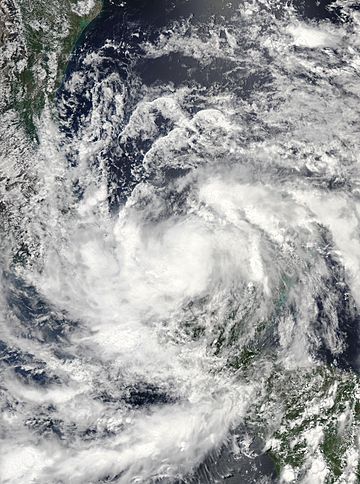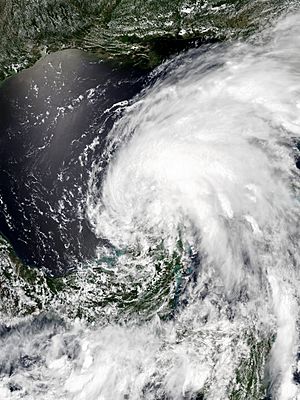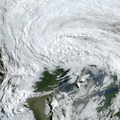Tropical Storm Cristobal (2020) facts for kids
| Tropical storm (SSHWS/NWS) | |

Tropical Storm Cristobal at peak intensity shortly after landfall in Campeche on June 3
|
|
| Formed | June 1, 2020 |
|---|---|
| Dissipated | June 12, 2020 |
| (Extratropical after June 10) | |
| Highest winds | 1-minute sustained: 60 mph (95 km/h) |
| Lowest pressure | 992 mbar (hPa); 29.29 inHg |
| Fatalities | 15 total |
| Damage | ≥ $665 million (2020 USD) |
| Areas affected | Central America, Mexico, Central United States, Great Lakes Region, Eastern Canada |
| Part of the 2020 Atlantic hurricane season and 2020 Pacific Hurricane season | |
Tropical Storm Cristobal was a powerful storm in 2020. It started from what was left of another storm called Tropical Storm Amanda. Cristobal formed over the Bay of Campeche on June 1. It caused a lot of damage in Mexico in the days that followed.
Later, it moved north and made landfall in Louisiana on June 7. After that, it became weaker, turning into a tropical depression. Eventually, it became a post-tropical storm over Wisconsin. Cristobal was special because it was a "crossover" storm. This means it started in one ocean basin (the Pacific) and its remnants helped form a new storm in another (the Atlantic). The storm caused 15 deaths and about $665 million in damages.
Contents
How Tropical Storm Cristobal Formed
On May 31, 2020, weather experts started watching Tropical Storm Amanda. Amanda was in the Eastern Pacific. They thought parts of it might move into the Atlantic. Tropical Storm Amanda made landfall in Guatemala and then faded away.
But some of its leftover energy and moisture moved. On June 1, these remnants went over the Bay of Campeche. They started to get organized again. Weather forecasters thought there was a very good chance a new storm would form. Soon after, it became a tropical depression.
Cristobal Becomes a Tropical Storm
On June 2, the system grew stronger and became Tropical Storm Cristobal. It began to move south. By June 3, it reached its strongest point. It had winds of 60 miles per hour (97 km/h) when it made landfall in Mexico. The storm then slowed down near Ciudad del Carmen. It weakened back into a tropical depression.
Cristobal's Journey North
Even though it was weaker, Cristobal started to move quickly toward the north. On June 5, it became a tropical storm again. This happened even though it was over the Yucatán Peninsula. It continued to get stronger, reaching a second peak with winds of 50 miles per hour (80 km/h).
The storm didn't look like a typical tropical cyclone at this point. But it still made a second landfall in Louisiana on June 6. It was at its peak strength when it hit Louisiana. The storm then moved to the east-northeast and got weaker. On June 10, Cristobal became a post-tropical storm over Wisconsin.
Images for kids
-
Tropical Storm Cristobal nearing landfall in Louisiana on June 7
See also
 In Spanish: Tormenta tropical Amanda–Cristobal para niños
In Spanish: Tormenta tropical Amanda–Cristobal para niños




